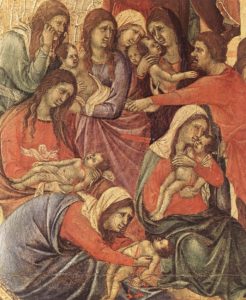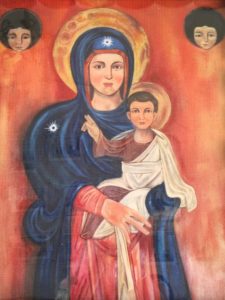Matthew 2:13-18
13 After they had left, suddenly the angel of the Lord appeared to Joseph in a dream and said, ‘Get up, take the child and his mother with you, and escape into Egypt, and stay there until I tell you, because Herod intends to search for the child and do away with him.’
14 So Joseph got up and, taking the child and his mother with him, left that night for Egypt,
15 where he stayed until Herod was dead. This was to fulfill what the Lord had spoken through the prophet: I called my son out of Egypt.
16 Herod was furious on realising that he had been fooled by the wise men, and in Bethlehem and its surrounding district he had all the male children killed who were two years old or less, reckoning by the date he had been careful to ask the wise men.
17 Then were fulfilled the words spoken through the prophet Jeremiah:
18 A voice is heard in Ramah, lamenting and weeping bitterly: it is Rachel weeping for her children, refusing to be comforted because they are no more.

During a recent retreat, I met a woman who was a parishioner in the church that welcomed and walked my whole family back to the Catholic Church. It was a non-silent retreat, so over lunch, I shared my experiences of the Holy Land, and she spoke to me about a trip she and her husband had taken to the Middle East.
Before the Syrian War had started in 2012, she asked a reluctant cabbie to drive them from Lebanon through the desert, to a monument in Syria along the Euphrates River, which marked the Armenian genocide by Turkish forces. The monument, as with many other Syrian institutions, has since been destroyed by ISIS and military conflict.
And as she recounted how the Armenian mothers, rather than have their daughters succumb to the enemy, would throw their daughters into the Euphrates, more than one-hundred years ago, we looked into each other’s eyes knowingly.
Such agonizing separations were more than likely still happening today due to the sectarian conflicts in the region. It is easy to look at the darkness of such atrocities with despair, but the birth of Jesus has already won the victory over death, for “The people who walked in darkness have seen a great light” (Isaiah 9:2).
The gospel accounts focus on the Holy Family’s narrow escape from Herod. After having received a vision from an angel in the middle of the night, Joseph immediately gathers the Virgin Mary and the child Jesus, to begin a journey of over 400 miles from Bethlehem to Egypt, mostly on foot.
There is only a brief mention of the suffering of the families in the surrounding districts of Jerusalem when all the male children two years and under were put to death, and only through the words of the Prophet Jeremiah, written around 600 BC, before the 586 BC Babylonian captivity of Jerusalem: “A voice is heard in Ramah [Ramallah today, near Bethlehem] lamenting and weeping bitterly: it is Rachel weeping for her children, refusing to be comforted because they are no more.”
Zechariah, written around 500 BC, after both the Babylonian captivity and the Israelites’ return to Jerusalem through the Great King Cyrus of Greece (538 BC), foretells this same event.
Zechariah 12: 8-14. On that day the LORD will shield the inhabitants of Jerusalem, so that the weakest among them will be like David on that day; and the house of David will be like God, like the angel of the LORD before them.
9 On that day I will seek the destruction of all nations that come against Jerusalem 10 I will pour out on the house of David and on the inhabitants of Jerusalem a spirit of mercy and supplication, so that when they look on him whom they have thrust through, they will mourn for him as one mourns for an only child, and they will grieve for him as one grieves over a firstborn.
11 On that day the mourning in Jerusalem will be as great as the mourning for Hadadrimmon in the plain of Megiddo. 12 And the land shall mourn, each family apart: the family of the house of David, and their women; the family of the house of Nathan, and their women; 13 the family of the house of Levi, and their women; the family of Shimei, and their women; 14 and all the rest of the families, each family apart, and the women apart.
The prophet Zechariah vividly captures the intense pain that the families must suffer alone, particularly the mothers of the children who have been massacred, for the mourning in Jerusalem happens ‘each family apart, and the women apart.’ I could not help but think about the countless mothers today, who must grieve in the silence of their hearts, the children they have lost through violence.
Yet hope comes in the most unlikely form.
Through Zechariah’s prophesy, the Lord promises that ‘the weakest among them will be like David.’ How could it be, that the most feeble could be as powerful as one of the greatest Kings of Judah? History bears out that the drops of blood shed by the most helpless, the innocent infants of Jerusalem, would be the seeds to the flourishing kingdom of Christ.
Zechariah also points to the connection between Jesus as among the children in the ‘House of David…who will be like God’ and Jesus, ‘the firstborn’ and ‘only child’ whom Jerusalem will recognize as ‘him whom they have thrust through.’ The great I am, the Word made flesh is the Lamb of God who comes to take away the sins – and all forms of captivity – of the world.
This recognition of faith and love does not happen automatically. It requires the human willingness of heart, a prayer of desire and ‘supplication,’ on our part to recognize who we are without God’s grace – coupled with the ‘mercy’ of God, who is always God with us – which results in genuine repentance and the healing of all wounds: war, death, scandal, evil, addictions, pain.
I will pour out on the house of David and on the inhabitants of Jerusalem a spirit of mercy and supplication.

